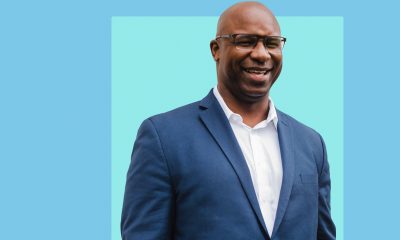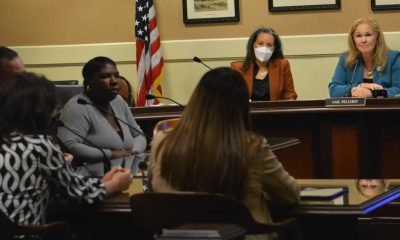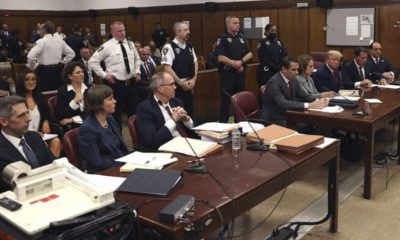Business
Black Business Spotlight: Wilson’s Image Barbers & Stylists
MINNESOTA SPOKESMAN-RECORDER — For the past decade or so, Teto Wilson’s barbershop has served as a Northside staple for not just a good haircut, but also as a place for gathering, good times, and even accessing community resources.

Teto Wilson (Submitted Photo)
By Stephenetta (isis) Harmo
For the past decade or so, Teto Wilson’s barbershop has served as a Northside staple for not just a good haircut, but also as a place for gathering, good times, and even accessing community resources.
After graduating from barber school in Malden, Mass., Wilson, an Illinois native, made his next move to Minnesota in 2000. Here he worked with a friend and fellow student and went on to open Wilson’s Image Barbers & Stylists in August 2007.
Since then, he has connected his passion for people with behind-the-chair therapy to become a prominent voice in the community. “When you come into my shop, it’s more than just a haircut,” said Wilson.
The MSR caught up with Wilson to talk about what it takes to prepare for entrepreneurship and how he combined his two passions to benefit the community.
MSR: What made you decide to open your own shop?
Teto Wilson: When I think back on the things that I did to generate money as a youngster, I’ve always kind of had, like, an entrepreneurial spirit. So, I knew eventually I was going to open up my own shop.
When I came to Minnesota, I worked with a lifelong friend of mine at his shop for seven years. It gave me an opportunity to get to know Minnesota. I built up a lot of clientele, but I knew that wasn’t going to be it for me to just stay working in their shop.
Around the fourth or fifth year, in my mind I was ready. But I hadn’t done things to get myself in position to do it. So I started planning. I started saving money, thinking about locations and how I wanted my business model to be structured. So, it took me a few years after I put it in my mind that it was going to happen.
MSR: What was that opening process like? What were some of your challenges?
TW: Even though I had been here for a few years, I didn’t know who’d be willing to take a chance to come and work with me as a start-up business owner. So, I took my time. Challenges were more making sure I chose the right location and that I had gained enough understanding from working under other barbershop owners of how [the business] actually works, taking what I learned from them and getting all the good that I saw from them and then bringing it into my own and doing things my own way. And getting the right people to work for me.
Also, we always talk about “buy Black” and “shop Black.” Well, you have to support Black. I give good service in a clean, safe environment at a fair price. So, just treat me like you would treat another establishment. You go in, you get what you want, you pay the price.
MSR: What’s one thing you would tell someone else who wants to launch their own business?
TW: I would tell them the same thing as some of the challenges that presented for me, [such as the importance of] location. If you have your own money, then that’s great. If you have to do financing, don’t get in over your head. You have to do your day-to-day management; you have bills, utilities. If you bought a building or if you’re renting, you have a lot of expenses that go with that. Just make sure you plan it out and don’t, don’t just go out there and say, “Hey, I want to open up a business” and throw caution to the wind hoping that it works. You have to be strategic about it.
MSR: What do you think makes a haircut experience in your shop so special?
TW: When people think of barbers and stylists as kind of like their therapist, I think about it as like we are working on their head and that’s how we end up getting in their head, whether it’s 30 minutes for a haircut or with women who can be in the shop for hours. That’s a real intimate time, so people like to share things that are important to them. For me, it’s a listening to what they got going on and making sure that I keep that personal.
Beyond that, it’s having a great haircut and listening and giving your customer what they’re asking for. If you can’t do it, maybe send them to another barber that can… Building relationships — it feels good, you get a great haircut, and you build a relationship with your customer, laugh and talk with them about some things that are important.
MSR: Outside of cutting hair, you have a scholarship fund, host community events. Why is that important for you?
TW: I’ve been cutting hair with a license now for about 25 years. But my passion — as much as I love to cut hair — is not cutting hair. My passion is community and being able to connect with people.
Being a barbershop owner and having my barbershop right in North Minneapolis gives me a space where I can connect with community. I look at the barbershop as a community resource hub. There’s a space in my shop called the situation room, and I designed it just like a round table. We have a lot of events where it could be conversations with the Minneapolis Public Schools superintendent…or with the Minneapolis chief of police and the newly elected Hennepin County sheriff.
Whether it’s around education, police and community relations, whatever it is that we can host here where people can gain from it, that’s what’s important to me. And having the parties and stuff like that, that’s a fun time, a way to give back, too.
MSR: What does success look like for you?
TW: When we’re all winning. I’m going to continue to grow and get in these spaces where I can connect and go to bat for our community. I also go to other spaces where I can gain for us, [and] I can bring it back so we can benefit from it.
The haircutting thing is down pat, you know what I mean? I’ve been doing that for years. But just making sure that our community continues to get what they need — that’s what success is for me.
Wilson’s Image Barbers & Stylists is located at 2201 W Broadway Ave. in North Minneapolis. From April 1 through June 30, MSR readers can mention this article for $5 off adult and kids hair cuts. For more info, visit wilsonsimage.com.
This article originally appeared in the Minnesota Spokesman-Recorder.
Activism
Oakland Post: Week of April 24 – 30, 2024
The printed Weekly Edition of the Oakland Post: Week of April 24 – 30, 2024

To enlarge your view of this issue, use the slider, magnifying glass icon or full page icon in the lower right corner of the browser window. ![]()
Bay Area
State Controller Malia Cohen Keynote Speaker at S.F. Wealth Conference
California State Controller Malia Cohen delivered the keynote speech to over 50 business women at the Black Wealth Brunch held on March 28 at the War Memorial and Performing Arts Center at 301 Van Ness Ave. in San Francisco. The Enterprising Women Networking SF Chapter of the American Business Women’s Association (ABWA) hosted the Green Room event to launch its platform designed to close the racial wealth gap in Black and Brown communities.

By Carla Thomas
California State Controller Malia Cohen delivered the keynote speech to over 50 business women at the Black Wealth Brunch held on March 28 at the War Memorial and Performing Arts Center at 301 Van Ness Ave. in San Francisco.
The Enterprising Women Networking SF Chapter of the American Business Women’s Association (ABWA) hosted the Green Room event to launch its platform designed to close the racial wealth gap in Black and Brown communities.
“Our goal is to educate Black and Brown families in the masses about financial wellness, wealth building, and how to protect and preserve wealth,” said ABWA San Francisco Chapter President LaRonda Smith.
ABWA’s mission is to bring together businesswomen of diverse occupations and provide opportunities for them to help themselves and others grow personally and professionally through leadership, education, networking support, and national recognition.
“This day is about recognizing influential women, hearing from an accomplished woman as our keynote speaker and allowing women to come together as powerful people,” said ABWA SF Chapter Vice President Velma Landers.
More than 60 attendees dined on the culinary delights of Chef Sharon Lee of The Spot catering, which included a full soul food brunch of skewered shrimp, chicken, blackened salmon, and mac and cheese.
Cohen discussed the many economic disparities women and people of color face. From pay equity to financial literacy, Cohen shared not only statistics, but was excited about a new solution in motion which entailed partnering with Californians for Financial Education.
“I want everyone to reach their full potential,” she said. “Just a few weeks ago in Sacramento, I partnered with an organization, Californians for Financial Education.
“We gathered 990 signatures and submitted it to the [California] Secretary of State to get an initiative on the ballot that guarantees personal finance courses for every public school kid in the state of California.
“Every California student deserves an equal opportunity to learn about filing taxes, interest rates, budgets, and understanding the impact of credit scores. The way we begin to do that is to teach it,” Cohen said.
By equipping students with information, Cohen hopes to close the financial wealth gap, and give everyone an opportunity to reach their full financial potential. “They have to first be equipped with the information and education is the key. Then all we need are opportunities to step into spaces and places of power.”
Cohen went on to share that in her own upbringing, she was not guided on financial principles that could jump start her finances. “Communities of color don’t have the same information and I don’t know about you, but I did not grow up listening to my parents discussing their assets, their investments, and diversifying their portfolio. This is the kind of nomenclature and language we are trying to introduce to our future generations so we can pivot from a life of poverty so we can pivot away and never return to poverty.”
Cohen urged audience members to pass the initiative on the November 2024 ballot.
“When we come together as women, uplift women, and support women, we all win. By networking and learning together, we can continue to build generational wealth,” said Landers. “Passing a powerful initiative will ensure the next generation of California students will be empowered to make more informed financial decisions, decisions that will last them a lifetime.”
Business
Black Business Summit Focuses on Equity, Access and Data
The California African American Chamber of Commerce hosted its second annual “State of the California African American Economy Summit,” with the aim of bolstering Black economic influence through education and fellowship. Held Jan. 24 to Jan. 25 at the Westin Los Angeles Airport Hotel, the convention brought together some of the most influential Black business leaders, policy makers and economic thinkers in the state. The discussions focused on a wide range of economic topics pertinent to California’s African American business community, including policy, government contracts, and equity, and more.

By Solomon O. Smith, California Black Media
The California African American Chamber of Commerce hosted its second annual “State of the California African American Economy Summit,” with the aim of bolstering Black economic influence through education and fellowship.
Held Jan. 24 to Jan. 25 at the Westin Los Angeles Airport Hotel, the convention brought together some of the most influential Black business leaders, policy makers and economic thinkers in the state. The discussions focused on a wide range of economic topics pertinent to California’s African American business community, including policy, government contracts, and equity, and more.
Toks Omishakin, Secretary of the California State Transportation Agency (CALSTA) was a guest at the event. He told attendees about his department’s efforts to increase access for Black business owners.
“One thing I’m taking away from this for sure is we’re going to have to do a better job of connecting through your chambers of all these opportunities of billions of dollars that are coming down the pike. I’m honestly disappointed that people don’t know, so we’ll do better,” said Omishakin.
Lueathel Seawood, the president of the African American Chamber of Commerce of San Joaquin County, expressed frustration with obtaining federal contracts for small businesses, and completing the process. She observed that once a small business was certified as DBE, a Disadvantaged Business Enterprises, there was little help getting to the next step.
Omishakin admitted there is more work to be done to help them complete the process and include them in upcoming projects. However, the high-speed rail system expansion by the California High-Speed Rail Authority has set a goal of 30% participation from small businesses — only 10 percent is set aside for DBE.
The importance of Diversity, Equity and Inclusion (DEI) in economics was reinforced during the “State of the California Economy” talk led by author and economist Julianne Malveaux, and Anthony Asadullah Samad, Executive Director of the Mervyn Dymally African American Political and Economic Institute (MDAAPEI) at California State University, Dominguez Hills.
Assaults on DEI disproportionately affect women of color and Black women, according to Malveaux. When asked what role the loss of DEI might serve in economics, she suggested a more sinister purpose.
“The genesis of all this is anti-blackness. So, your question about how this fits into the economy is economic exclusion, that essentially has been promoted as public policy,” said Malveaux.
The most anticipated speaker at the event was Janice Bryant Howroyd known affectionately to her peers as “JBH.” She is one of the first Black women to run and own a multi-billion-dollar company. Her company ActOne Group, is one of the largest, and most recognized, hiring, staffing and human resources firms in the world. She is the author of “Acting Up” and has a profile on Forbes.
Chairman of the board of directors of the California African American Chamber of Commerce, Timothy Alan Simon, a lawyer and the first Black Appointments Secretary in the Office of the Governor of California, moderated. They discussed the state of Black entrepreneurship in the country and Howroyd gave advice to other business owners.
“We look to inspire and educate,” said Howroyd. “Inspiration is great but when I’ve got people’s attention, I want to teach them something.”
-

 Activism4 weeks ago
Activism4 weeks agoOakland Post: Week of March 27 – April 2, 2024
-

 #NNPA BlackPress4 weeks ago
#NNPA BlackPress4 weeks agoCOMMENTARY: D.C. Crime Bill Fails to Address Root Causes of Violence and Incarceration
-

 #NNPA BlackPress4 weeks ago
#NNPA BlackPress4 weeks agoMayor, City Council President React to May 31 Closing of Birmingham-Southern College
-

 #NNPA BlackPress4 weeks ago
#NNPA BlackPress4 weeks agoBeloved Actor and Activist Louis Cameron Gossett Jr. Dies at 87
-

 Community1 week ago
Community1 week agoFinancial Assistance Bill for Descendants of Enslaved Persons to Help Them Purchase, Own, or Maintain a Home
-

 Activism3 weeks ago
Activism3 weeks agoOakland Post: Week of April 3 – 6, 2024
-

 Business1 week ago
Business1 week agoV.P. Kamala Harris: Americans With Criminal Records Will Soon Be Eligible for SBA Loans
-

 Activism2 weeks ago
Activism2 weeks agoOakland Post: Week of April 10 – 16, 2024
























































